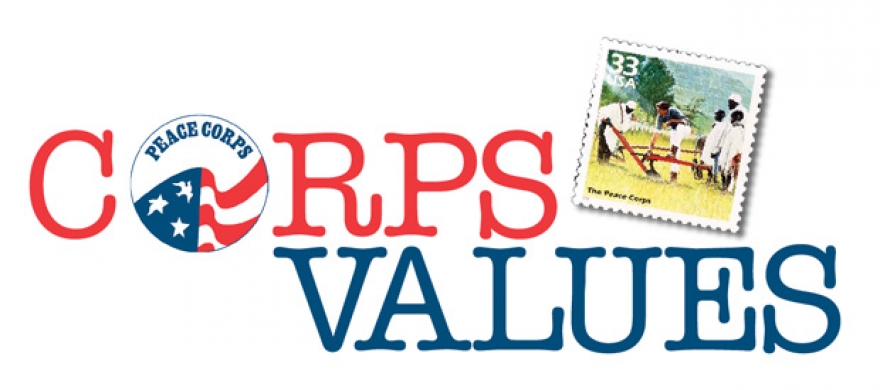Corps Values
Pepperdine alumni recall their experiences abroad as the Peace Corps reaches a milestone.
Fifty years ago, President John F. Kennedy stood in front of 10,000 college students at an impromptu presidential campaign speech in Ann Arbor, Michigan, and proposed a unique opportunity never before suggested to the youth of America: to live, work, and promote peace in developing countries around the world. A few months later, on March 1, 1961, Sargent Shriver established the Peace Corps and college graduates lined up in droves to volunteer in countries such as India, Ghana, Burma, and Tanganyika.
After five decades of dedication and service, the program has drawn approximately 200,000 volunteers who have served in 139 countries and influenced progress and change around the world. Today there are 13 Pepperdine alumni serving overseas with the Peace Corps, with nearly 150 having served since the organization's founding. As Pepperdine University celebrates its 75th anniversary, it recognizes those alumni who have lived out the cornerstones of purpose, service, and leadership in the Peace Corps. Here are some of their stories.
John Payne (MPP '06) - Letlhakane, Botswana
Ryan and Lindsay Dapremont (both '07) - Saramacca, Suriname
Mike Anderson ('92) - Chatrakan, Thailand
Douglas Tyson (MPP '12) Banjul, The Gambia, West Africa
Christopher S. Collins ('02) - Vanuatu, South Pacific
Troy ('02) and Tabitha ('03) Snowbarger - Muapitane, East Timor
Brittany Krake ('07, MDR '07) - Malawi, Africa
Elizabeth Austin ('08, MA '09) - Mbabane, Swaziland
Tiffany Riendeau ('05, MA '07) - Mali, West Africa
James C. (Chip) and Sharyn Moore (both '67) - Lahad Datu, Sabah, Malaysia
Travis ('05) and Harmony ('06) Weber - Kamwatta Village, Guyana
John Payne (MPP '06)
Location: Letlhakane, Botswana
Dates of service: 2007–09
Position: HIV/AIDS prevention volunteer
I ran Boteti GLOW (Girls Leading Our World) Camp, an experiential learning and life-skills education program for adolescents, both regionally and at two national GLOW camps as a secondary project. I focused on teaching kids about HIV, child abuse, and familial relationships in an exploratory and participatory way.
Our concept of Africa is much different than reality. Botswana is more developed than other countries. Everybody has cell phones and I had Internet in my office during my service.
After the Peace Corps, I interned for a consultant evaluating the Ministry of Education's national life-skills curriculum. In 2010, I was an HIV/AIDS missions officer in Zambia for Life Restoration Partners, a Christian nongovernmental organization. I also began a one-year Peace Corps Response assignment in July 2011 as an HIV program specialist in the Limpopo Province Department of Health in South Africa.
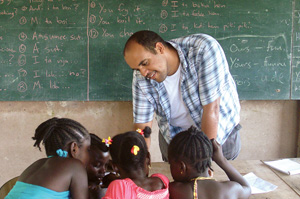
Ryan and Lindsay Dapremont (both '07)
Location: Saramacca, Suriname (South America)
Dates of service: 2010–present
Positions: community economic development volunteer; health education volunteer
Ryan: You have to be very culturally sensitive so as not to criticize the culture, but
still let the girls know that this isn't how it is in all parts of the world. The
reality is that they're not going to get that if they stay in Saramacca, but they're
aware that they can figure out their own path for themselves.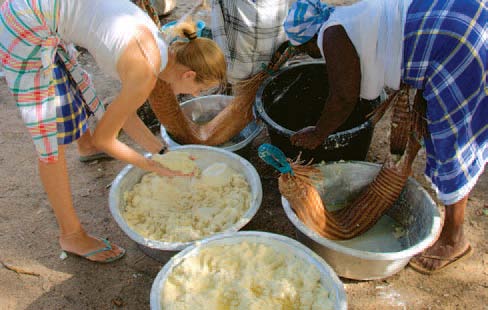
When we got back home after our first training session, our host father and brothers were tearing down an interior wall in the house and expanding another room so we would have enough space to stay with them. They wanted us to be there so badly that they rebuilt their entire house in one day to accommodate us.
Lindsay: The Saramaccans conduct church services in the street language that the Bible is printed in, not the one language that I'm learning, so it's a lot harder for us to understand what's going on. Maintaining our spirituality is challenging because we can't take quiet time very easily, but I think that puts more of a responsibility on ourselves to try to take time whenever we can.
Mike Anderson ('92)
Location: Chatrakan, Thailand
Dates of service: 1995–1997
Position: public health extension worker
After Peace Corps, I worked at Pepperdine, where I ran the physical education program from 2001 to 2005 and was able to start the first International Programs study abroad trip to Thailand. Four out of 10 of the first-year students are now living and working in Thailand, Malaysia, and the Middle East.
I went to my site with the unrealistic expectation that I was going to do a lot of work and that things were going to happen quickly. But, the first eight months were about developing relationships with people. There was iodine deficiency within some schools, because they didn't use iodized salt.
The government's public health department would hold youth health education camps,
where adolescent leaders in the community would attend our workshops to become more
aware of health issues.
Read more »
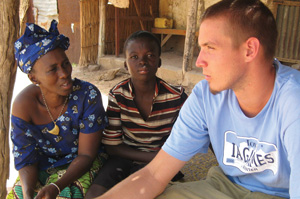 Douglas Tyson (MPP '12)
Douglas Tyson (MPP '12)
Location: Banjul, The Gambia, West Africa
Dates of service: 2007–09
Position: information and communications technology educator
I was posted in a town of 500 people, where I lived in a little hut with a tin roof that got up to 120 degrees. There was no running water or electricity. I took showers in the backyard with a bucket and had a little pit latrine. I was miles away from civilization, but was later relocated to the capital city and lived in a simple apartment with intermittent electricity and running water.
Some days would consist of teaching at the Gambia YMCA, where I would teach a Photoshop
class in the morning and go to a tertiary school after lunch to teach print media,
Photoshop, and web design to educators. In the evening, I would work with an ecotourism
group to create graphic productions and do marketing, advertising, and consulting
work.
Read more »
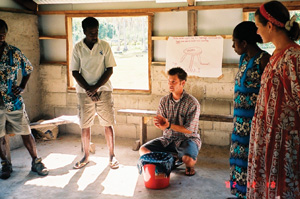 Christopher S. Collins ('02)
Christopher S. Collins ('02)
Location: Vanuatu, South Pacific
Dates of service: 2002
Position: rural training center volunteer
I was expecting to go in being an expert at something, but it was primarily a learning experience for me. I was fascinated by their ability to use sustainable materials for construction, to farm, and raise livestock. Global views of development will erode these practices, but I was blessed to be able to see communities in villages where no one was poor or homeless.
My very first night in the village was tough because my host family didn't speak English
and I did not speak Bislama, their local village language. I sat down with my host
family to show them pictures of my family, and upon turning to the first photo, my
host mother made an "uh-uh" noise. This is a synonym for "no" in American English,
so I had no idea what her objection was. Months later, when I had a grasp of Bislama,
we shared a hilarious conversation about how "uh-uh" in Bislama is a parallel to "uh-huh"
or "yes" in American English.
Read more »
Troy ('02) and Tabitha ('03) Snowbarger
Location: Muapitane, East Timor
Dates of service: 2006
Positions: community economic development volunteers
Tabitha: We were really interested in reducing poverty and helping people in third world countries. I was interested in seeing firsthand that through relationship building, we can create peace and mutual understanding.
There was an attempted coup in East Timor in 2006 and we had to be immediately evacuated
to Thailand. We had 20 minutes to pack and were on a plane in the next 24 hours. The
political climate in Timor was too unstable for us to go back. It was a pretty traumatic
experience. We taught English with the Thai government for seven months and met the
international director of a nongovernmental organization called Partners in Progress,
who invited us to come to Cambodia and later offered us a job. We now serve as the
organization's development directors. We've been in Cambodia for about four years.
Read more »
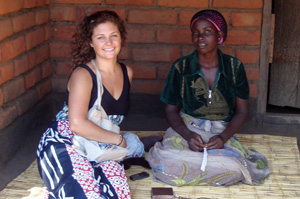 Brittany Krake ('07, MDR '07)
Brittany Krake ('07, MDR '07)
Location: Malawi, Africa (Khombedza in the district of Salima)
Dates of service: 2009–11
Position: community health advisor
The most challenging aspect was adhering to traditional gender roles. They didn't understand why, at my age of 24, I wasn't fulfilling the traditional role of wife and mother. Through strategic communication and educational opportunities, however, my community eventually came to view me as a professional, an intellectual, and an agent for progress.
I wrote a letter to the vice president of Malawi, Joyce Banda, requesting that she
come and speak with the young women attending Camp GLOW about the challenges of asserting
herself as a woman in Malawi. We thought it was a long shot, but she joined us and
delivered an inspiring speech, surely bestowing those young women with the honor of
a lifetime.
Read more »
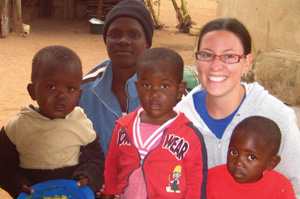 Elizabeth Austin ('08, MA '09)
Elizabeth Austin ('08, MA '09)
Location: Mbabane, Swaziland
Dates of service: 2010–present
Position: community health HIV/AIDS educator
I deal with issues of gender inequality, conflicts of traditional beliefs, communication breakdowns, and general loneliness. The most challenging encounter I face is trying to take a backseat position and find other community members who are motivated and work with them, teach them, and empower them to implement the things they see a need for within the community.
Watching as the kids show sudden understanding of issues of poverty, HIV, and gender roles never fails to give me a terrific feeling. I also love it when the teacher shares that I've given her the confidence and knowledge to try a new idea.
My favorite memory is when I met my host mother, who promptly grabbed me in a bear
hug, threw me over her shoulder, and jumped up and down with me. She doesn't speak
more than a few words of English, but she wouldn't let go of my hand for the rest
of the day. My nervousness and fears were quickly transformed into a satisfying feeling
of belonging.
Read more »
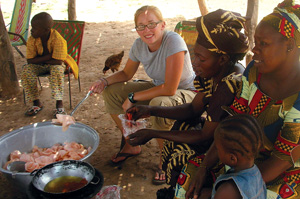 Tiffany Riendeau ('05, MA '07)
Tiffany Riendeau ('05, MA '07)
Location: Mali, West Africa
Dates of service: 2008–09
Position: education volunteer
I wanted to live with people, learn their language and culture, and be with them. I wanted, at the deepest level, to understand their needs, ambitions, and desires and help them achieve those in any way I could.
We all owe two years of our life to something bigger than ourselves; to service. Maybe not because the changes we are responsible for are that enduring or substantial, but because the change that happens to our souls is enduring and substantial.
Mali is the second poorest country in the world, but it really became a home for me.
It's surprising to find that home is less about climate and showers and food and more
about living and loving people.
Read more »
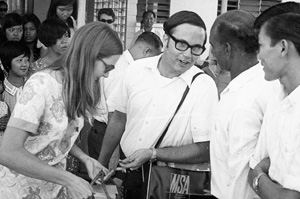 James C. (Chip) and Sharyn Moore (both '67)
James C. (Chip) and Sharyn Moore (both '67)
Location: Lahad Datu, Sabah, Malaysia
Dates of service: 1967; 1968–69
Position: teaching volunteers (junior secondary school)
Chip: Our travel plans to revisit Lahad Datu became the occasion for a 25th reunion with our students, many of whom had not seen each other in almost as many years. How amazing it was that these students, many of whom had been the first in their families to attend any school, were now shopkeepers, medical and financial professionals, contractors, and politicians. We were all so proud and thankful for the opportunity to acknowledge how much we had learned and taught each other.
The Peace Corps was the reason I ended up in human resources at Pepperdine. I had always looked forward to trying to duplicate the experience, where you were just a little out of culture and expected to talk to everybody around you from all levels of society. I found that HR was exactly that.
Sharyn: Chip and I left for Peace Corps two weeks after we graduated. I found that
I loved teaching and came back to a now 37-yearlong career teaching international
students. Peace Corps made a difference, and so do we all.
Read more »
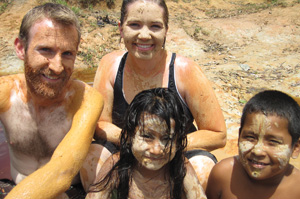 Travis ('05) and Harmony ('06) Weber
Travis ('05) and Harmony ('06) Weber
Location: Kamwatta Village, Guyana
Dates of service: 2011–present
Positions: community health volunteer; community education volunteer
Both of us are lifelong members of the Churches of Christ, and were shocked to see one in our community. It has been neat to worship with the Amerindians and see how similar and yet how different the worship experience is here.
Guyana is hoping to partner with developed countries in the exchange of carbon credits, which will allow them to continue their development while keeping the rainforest pristine. We're excited to see how these policies will develop over the next two years.
As a married couple, we always have an understanding companion by our side. It's nice
to always be able to share our challenges and successes with each other.
Read more »
John Payne cont'd.
My primary duty was to assist a government official who was the AIDS coordinator for a rural district in the Kalahari desert with a population of approximately 60,000 people. My job was to build his capacity to conduct research and improve their policy/program planning, so I was given training by the Peace Corps and the government. My job not only involved training him, but also other government officials and even some Nongovernmental Organizations. I worked in the multisectoral AIDS committee, a coalition of representatives from different sectors, to supply them with information about trends in the district and strategies for improving programs in their workplace. HIV testing was a big one.
I think the most challenging aspect of my work was being an outsider, a foreigner. It was frustrating because there were things that I didn't understand and things I wasn't used to. When you work in a different country for two years, it's long enough to get adjusted and acclimated, but it's not long enough to become proficient in the local or professional cultures.
I became interested in AIDS education during graduate school at Pepperdine. I had friends who were from Africa and played rugby with Kenyan expatriates while in Washington, DC, for an internship. I realized that not only is HIV one of the greatest health problems in Africa, but also one of the biggest development problems. I was fortunate to come across a job at UCLA and was so inspired by the people I worked with there. A lot of them had been doing this work since the '80s. They encouraged me to go to Africa and were cheering me on to join the Peace Corps in Africa. It hasn't become an experience that has burned me out, tired, or depressed me, but the more I do it, the more hopeful and inspired I feel.
My expectations of Africa were much different prior to my journey. They warned us about that. They warned us that our concept and perspective on Africa is going be a lot different than reality. We Americans shape our views around the media and the media usually shows us one side. It is also not very international. We don't really cover global issues from other countries from their perspectives; we just cover it from the American perspective. My assignment was in a large village. It was more like a town, so I was in a place that was more developed than I actually expected it to be and that ended up being a good thing for me.
Most Peace Corps volunteers really love to travel, and I was one of them, but I didn't
really cover the typical tourist places like the beach or South Africa. I most enjoyed
seeing villages and journeyed up to Zambia several times, which is how I got to my
next job in Zambia where I worked after Peace Corps. I covered Botswana a lot with
work. I also played rugby in a men's league and coached a women's rugby team in my
free time.
Go back ^
Ryan and Lindsay Dapremont (both '07) cont'd.
Lindsay: The most difficult aspect of being a Peace Corps volunteer is that it's day after day and it's constantly up and down. As much as I participate in cultural activities (funerals, birthdays, burials), at the end of the day, I'm never going to be one of them. I'm just a "white girl" and I think just knowing that and continuing to have the motivation to get out of my house and talk to people everyday, and just keep going for the 27 months that I'm here is challenging. A lot of times, people from the Western world go in and think, "It would be better if they did it this way," or "While you're doing that, just do this." You can't bulldoze a culture like that and you can't tell people to change before you understand them.
Lindsay: There are definite pluses to serving with your spouse, but there are also negatives. It's a very different experience than everyone else's. The positives are that you have company, somebody else who is American, someone you can communicate with in English if you're frustrated or upset. We're obviously a lot less lonely than the other volunteers. One of the negatives is that my role in my community and their expectations of me are so different than other people's, because I'm a married woman. In Saramaccan culture, my purpose is to serve my man and to produce children. We don't have any children yet (you can't serve if you have young children). I'm 26 and they think that I should have had five children by now!
One of our counterparts in our village just started speaking to me about projects
and just in general. Before that he would only speak to my husband, really. Whereas,
if you're a single female volunteer, they have no choice but to speak to you, take
you in easier, and integrate you into their culture.
Go back ^
Mike Anderson ('92) cont'd.
I had always known that I wanted to live abroad after traveling for a little bit. Initially, I was in the Heidelberg program as a sophomore at Pepperdine. My decision to join the Peace Corps involved a combination of things: first, living abroad for that year. Secondly, I had done a lot of traveling in Central America over summer and Christmas break during my college career. One of my roommates was from Guatemala and, at one point, he just suggested that we go to there for Christmas. I ended up going back to Central America in the last years of college. I also always liked traveling when I was younger.
My family went to Mexico when I was seven or eight years old, and I loved the idea that things were different. I loved learning new languages. I was one of those ppl in high school who actually learned how to speak Spanish! I didn't take any foreign language before I went to Germany, because I applied to the Heidelberg program last minute. I felt so incapacitated when I landed there, that I studied really hard and did very well. I didn't know I had that capacity to learn languages, and when it came time to learn Thai, learning languages and speaking to people were very helpful. Thirdly, my freshman advisor at Pepperdine was a returned Peace Corps volunteer. There was another student in the Heidelberg program who was applying to join the Peace Corps. I wanted to travel and live and work abroad, and I thought that was a really great way to do it.
When you tell people about your experience, there is a very small percentage of people in the population that can say, "I was in the Peace Corps, too." In a group of 10, invariably six or seven of them will say they've thought about it. One of the most common reasons why people don't go is because, when you're 22 years old, two-and-a-half years seems like such a long time. When I think of what I gained from being in the Peace Corps, it seems like I didn't sacrifice anything at all. Looking back on it now, two-and-a-half years years is nothing.
I didn't feel like I was a volunteer. I was volunteering, but I was being paid enough
to live. It's just like any other job. I worked independently in a rural village where
no one spoke any English. They were all Thai of Lao and Mong ethnicity. I was an individual
living in a town of about 3,000 people. I lived with a family in which the mom and
dad were both teachers, so in terms of income, it was upper class living, but everyone
kind of lives the same. It was a stilted house, but they eventually built walls around
the downstairs area. In most houses, the second floor is the main floor and underneath
is an open area. But, as people get a little more money, they concrete the underside
of the house, so it looks like a two-story house. I woke up every morning at sunrise
and made breakfast–the main meal for the family–with my host mom.
Go back ^
Douglas Tyson (MPP '12) cont'd.
The country itself is peaceful in that it has so few natural resources. They have next to nothing that the world is interested in: no oil, no fantastic environment–most of the world has kind of left it alone. People are humble and are not really a part of what's going on around them. I was able to open up pretty effectively to the locals, and at first, wasn't really sure what to expect. The Peace Corps doesn't send you to places that are very tense. They want Americans to feel comfortable and safe.
Gambia is a country based on the Gambia River. They don't have bridges over the river–there is a ferry. The Gambians don't form lines, so when getting onto the ferry, the passengers just push their way forward. Those recognized as foreigners are targeted during the pushing and shoving, those recognized as foreigners are targeted by pickpockets. I was really careful about what I did in those situations. The Peace Corps teaches you safety tactics, so whenever I was getting into these highly active public areas, I'd take everything out of one pocket, put all of my things in the other one, and put my hand in my pocket.
I told myself to not have any expectations. I hadn't been to Africa before, so when I considered Gambia, I figured it was really just tiny little villages with huts in them. When I was placed in the big city, it's wider and sprawling and encompasses about one million people. It surprised me that there was a big city. It's just small little half-completed buildings. I guess I was expecting more of a country feel.
The Peace Corps directed me to the Masters in Public Policy program that I'm in now. Since I joined the Peace Corps not knowing what I wanted to do, then going to Gambia, I feel like it made me want to go and help developing countries and their people abroad. It was the start of my education in the public policy and international relations areas of study. I think that for anybody considering going into the field, it will teach you a lot about foreign cultures and the people in them. I want to work for NGOs that work with the Arab-Israeli conflict.
What I'm hoping to take out of it and perhaps hoping to contribute to the organization is seeing the effects on the people and why they feel the way they do. A lot of people in Western countries find it hard to understand why actions are taken by certain people and why they do the things they do, and you can learn so much just by living in a foreign culture. You really start to understand why people feel the way they do.
I came back to the States and felt like the entire country had changed. All of my favorite restaurants and stores had closed, I came back to everyone having internet on their phones, and TVs were digital, but I found that I didn't really care. It seemed like everybody was talking about different things and you feel out of the loop. But, for me, after Peace Corps, I spent a year teaching English in South Korea, and that's pretty much a developed country. Going from a developing country to America is an interesting adjustment.
The people are completely different. One of the hard things is that when you join
the Peace Corps, you're leaving your friends and your family and you're going to spend
two years abroad. It's hard to sink in. I felt some homesickness, but I was able to
deal with it better than some. When you leave your host country, it's like leaving
America in that you're leaving your close friends/family. The difference is that there's
a decent chance that you will never see these people again.
Go back ^
Christopher S. Collins ('02) cont'd.
I have been working at Pepperdine as the Assistant Provost for Assessment and Institutional Effectiveness. In August 2011, I am starting as an Assistant Professor of Education at the University of Hawai'i, Manoa. My experience in the Peace Corps has shaped my research interests in globalization and higher education. This year I published my first book, "Higher Education and Global Poverty: University Partnerships and the World Bank in Developing Countries."
I used experiences from the Peace Corps as an anecdotal preface to many of the chapters to show how my experience shaped my thinking about the function of education in developing countries. The online platform for my research interests related to these areas is: www.globalhighered.com. My work, my faith, and my relationships are shaped by my Peace Corps experience, because it cultivated a deep desire to understand and promote justice.
I was in Vanuatu, and island country in the South Pacific, about 500 miles west of Fiji. My assignment was to support a Rural Training Center (RTC). These were facilities designed to educate students in practical skills like woodworking, speaking English, and other trade related activities. Primary school is mandatory and free, but secondary school requires families to pay tuition. RTCs were a much less expensive option than formal secondary school.
There are a few Peace Corps volunteers I still keep up with. More importantly, the host family I stayed with is still very special to us. I brought my wife back to the village in the summer of 2009 for an amazing trip. We stayed in the village and had a wonderful time catching up on how things had changed in the last few years. The biggest change was that everyone had a cell phone—even though there was no electricity.
What most surprised me about my host country was ending up at a Church of Christ potluck
on my very first Sunday on the island. It is amazing how church culture commonalities
diffuse around the world.
Go back ^
Troy ('02) and Tabitha ('03) Snowbarger cont'd.
At first, the village we were living in didn't know we were coming, so when we pulled up, they were shocked to see foreigners there. The village chief knew, and he had tried to spread the word. Timor has a very recent past with genocide due to relations with Indonesia and any foreigners are looked at suspiciously. We sometimes even had rocks thrown at us by kids. After a while, people started warming up, specifically one young woman who in the area of Timor where they have a caste system, royalty, etc.
She was a member of the royal part of the tribe—a princess—so when she accepted us, then other people started being more open to interacting with us. By the time we left, we had more friends than skeptics. They told us they thought we were spies, because the Peace Corps required us to use a really big satellite phone with a long antenna. They thought it was some kind of strange gun or device.
After we were evacuated from East Timor, they cut the program. They gave us the opportunity
to go to a different country or wait to see if Timor opened back up. We chose to wait,
but after six months, we got tired of waiting and they still haven't opened up East
Timor to the Peace Corps. It was too traumatic to move to another place.<
post
Summer 2011
https://www.pepperdine.edu/magazine/2011/07/dan-caldwell-examines-us-policy-toward-afghanistan-pakistan-and-iraq-new-book
07/21/2011 12:15:00 PM
Pepperdine Magazine is the feature magazine for Pepperdine University and its growing
community of alumni, students, faculty, staff, and friends.
/magazine/images/main-temp/summer-2011/dan-caldwell.jpg
Pepperdine University
/magazine/images/thumb/summer-2011/dan-caldwell-360x360.jpg
Gareen Darakjian
News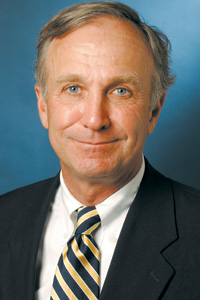
Vortex of Conflict traces the historical development of relations between the United States and the Islamic world, Afghanistan, Pakistan, and Iraq, and contains a comprehensive chronology of the major international events since the 9/11 attacks.
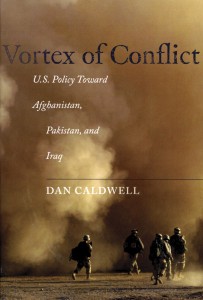 Caldwell presents a clear history of U.S. foreign policy pre-1979, examining the revolution
in Iran, the Soviet invasion of Afghanistan, the first Gulf War, the rise of Al Qaeda,
the emergence of “the Bush Doctrine,” and other significant events. Within this context,
he outlines and analyzes the major issues of the two wars, including intelligence
quality, military operations, U.S. relations with allies, the shift from a conventional
to a counterinsurgency strategy, the military surges in Afghanistan and Pakistan,
and postwar reconstruction. Caldwell concludes by summing up key lessons to be learned
from the wars and their application to future conflicts.
Caldwell presents a clear history of U.S. foreign policy pre-1979, examining the revolution
in Iran, the Soviet invasion of Afghanistan, the first Gulf War, the rise of Al Qaeda,
the emergence of “the Bush Doctrine,” and other significant events. Within this context,
he outlines and analyzes the major issues of the two wars, including intelligence
quality, military operations, U.S. relations with allies, the shift from a conventional
to a counterinsurgency strategy, the military surges in Afghanistan and Pakistan,
and postwar reconstruction. Caldwell concludes by summing up key lessons to be learned
from the wars and their application to future conflicts.
Before joining the Pepperdine faculty, Caldwell held positions at the Naval Postgraduate School in Monterey, California, Brown University, and the Executive Office of the President in Washington, D.C. His books include American-Soviet Relations, The Dynamics of Domestic Politics of Arms Control, World Politics and You, and Seeking Security in an insecure World. He is a member of the Council on Foreign Relations and chair of the council's academic outreach initiative.
